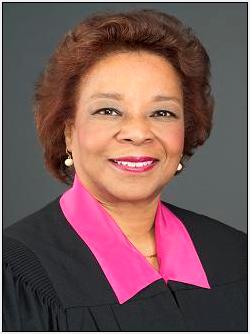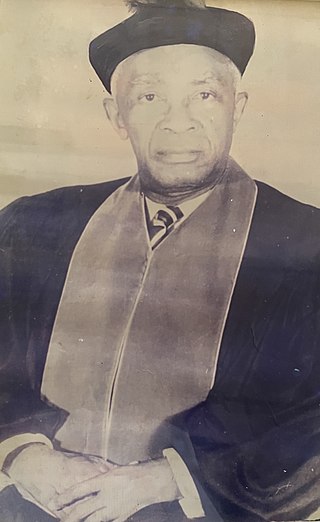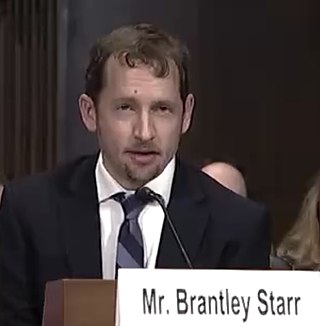
The American Bar Association (ABA) is a voluntary bar association of lawyers and law students; it is not specific to any jurisdiction in the United States. Founded in 1878, the ABA's stated activities are the setting of academic standards for law schools, and the formulation of model ethical codes related to the legal profession. As of fiscal year 2017, the ABA had 194,000 dues-paying members, constituting approximately 14.4% of American attorneys. In 1979, half of all lawyers in the U.S. were members of the ABA. The organization's national headquarters are in Chicago, Illinois, and it also maintains a significant branch office in Washington, D.C.

Constance Baker Motley was an American jurist and politician, who served as a Judge of the United States District Court for the Southern District of New York.

Rosemary Barkett is a Mexican-American judge of the Iran–United States Claims Tribunal located in The Hague, Netherlands since 2013. Previously, she served as a United States circuit judge of the United States Court of Appeals for the Eleventh Circuit. Prior to her nomination for that post, she was chief justice of the Florida Supreme Court.

The number of women in the United States judiciary has increased as more women have entered law school, but women still face significant barriers in pursuing legal careers.

The Association of the Bar of the City of New York, commonly referred to as the New York City Bar Association, founded in 1870, is a voluntary association of lawyers and law students. Since 1896, the organization has been headquartered in a landmark building on 44th Street, between Fifth and Sixth Avenues in Manhattan. Today the City Bar has more than 23,000 members. Its current president, Susan J. Kohlmann, began her two-year term in May 2022.
Janice Marie Holder is an American judge who served as a circuit court judge for Tennessee's Division II Circuit Court in the 30th district, served as the third woman justice on the Tennessee Supreme Court from 1996 until 2014, and was the first female Chief Justice of Tennessee on the Tennessee Supreme Court from 2008 until her retirement in 2014.

Frederica Massiah-Jackson is a Philadelphia County Court of Common Pleas judge. She served as President Judge from November 2000 to January 2006.

James Alexander Adolphus Pierre was the 13th Chief Justice of Liberia, serving from 1971 until his death in 1980. He had previously served as the Attorney General of Liberia from 1964 to 1971 in the administration of William Tubman.
Legal Momentum, founded in 1970, is a 501(c)(3) nonprofit and the nation's first and longest-serving legal advocacy group for women in the United States. Betty Friedan and Muriel Fox were its co-founders and Muriel Fox is an ongoing leader of the organization. Carol Baldwin Moody became President and CEO in April 2018. The organization, founded as the NOW Legal Defense and Education Fund, became Legal Momentum in 2004. Legal Momentum is a multi-issue organization dedicated to advancing women’s rights and gender equality, particularly in the areas of equal education opportunities; fairness in the courts; ending all forms of gender-based violence; workplace equality and economic empowerment. The organization employs three main strategies: impact litigation, policy advocacy, and educational initiatives. It is headquartered in New York City.

David Brock Hornby is an inactive senior United States district judge of the United States District Court for the District of Maine.

Milton Irving Shadur was a United States district judge of the United States District Court for the Northern District of Illinois.
The New York County Lawyers Association (NYCLA) is a bar association located in New York City.

Penelope (Penny) Andrews is a South African and American legal scholar.
Georgina "Gina" Martinez Benavides is a justice at the Texas Thirteenth Court of Appeals based in Corpus Christi and Edinburg. She was first elected in 2006, and re-elected in 2012. She is a member of the Democratic Party and resides in McAllen, Texas.

California Women Lawyers (CWL) is the statewide bar association for women in the U.S. state of California. Headquartered in Sacramento, CWL was founded in 1974 to seek the professional advancement of women lawyers, to promote gender equity in the legal profession and the judiciary, and to advance women's rights generally.
Anna Elizabeth Blackburne-Rigsby is the chief judge of the District of Columbia Court of Appeals, the highest appellate court for the District of Columbia. She works very closely with her husband Robert Rigsby and has great influence from her mother, Laura D. Blackburne.
Désirée Patricia Bernard is a Guyanese lawyer and jurist who was the country's first female judge of the High Court in 1980 and Justice of Appeal of the Supreme Court in 1992. She was appointed Chief Justice of Guyana in 1996, Chancellor of the Judiciary of Guyana and the Caribbean in 2001 and a Judge of the Caribbean Court of Justice in 2005. In 2014, she was appointed to the Bermuda Court of Appeal.
Ayesha A. Malik is a Pakistani judge. She is the first female judge of the Supreme Court in the history of Pakistan. On 6 January 2022, the Judicial Commission of Pakistan approved her appointment to the Supreme Court of Pakistan. She took her oath of office on 24 January 2022. Malik has also served as a Judge of the Lahore High Court in Pakistan from 27 March 2012 to 5 January 2022.

Brantley David Starr is a United States district judge of the United States District Court for the Northern District of Texas.
The International Association of Women Judges (IAWJ) is a non-profit non governmental organization founded in 1991 whose members are judges from around the world committed to equal justice for women.











